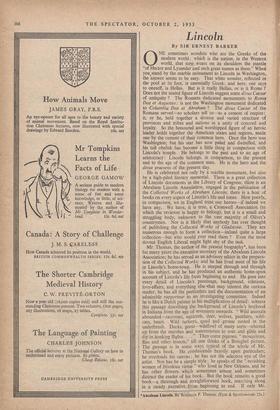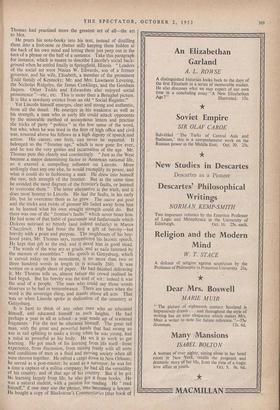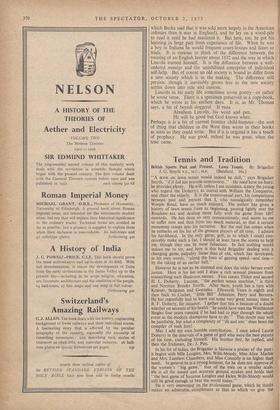Lincoln
By SIR ERNEST BARKER 0 NE sometimes wonders who are the Greeks of the modern world : which is the nation, in the Western world, that now wears on its shoulders the mantle "of Hector and Lysander and such great names as these." When you, stand by the marble monument to Lincoln in Washington, the 'answer seems to be easy. That white wonder, reflected in the pool at its foot, is essentially Greek; and here, one says to oneself, is Hellas. But is it really Hellas, or is it Rome ? Does not the seated figure of Lincoln suggest some divus Caesar of antiquity ? The Romans dedicated monuments to Roma Dea et Augustus: is not the Washington monument dedicated to Columbia Dea et Abraham ? The divus Caesar of the Romans served—so scholars tell us—as a cement of empire : it, or he, held together a diverse and varied structure of provinces and tribes and nations in a unity of concord and loyalty. So the honoured and worshipped figure of an heroic leader holds together the American states and regions, made one by the cement of their common hero. Once the hero was Washington; but his star has now paled and dwindled, and his tall obelisk has become a little thing in comparison with Lincoln's temple. He belongs to the past and to an age of aristocracy : Lincoln belongs, in comparison, to the present and to the age of the common man. He is the hero and the divus praesens of the present day. He is celebrated not only by a marble monument, but also by a high-piled literary memorial. There is a great collection of Lincoln documents in the Library of Congress; tliere is an Abraham Lincoln Association, engaged in the publication of the Collected Works of Abraham Lincoln; there is a host of books on every aspect of Lincoln's life and times. How poorly, in comparison, we in England treat our heroes—if indeed we have any. We have, it is true, a Cromwell Association (to which the reviewer is happy to belong); but it is a small and struggling body, unknown to the vast majority of Oliver's countrymen. Nor is it likely that anybody has ever thought of publishing the Collected Works of Gladstone. They are numerous enough to form a collection—indeed quite a large collection—but who would ever read them ? Even the mdst devout English Liberal might fight shy of the task. Mr. Thomas, the author of the present biography*, has been for many years the executive secretary of the Abraham Lincoln Association; he has served as an advisory editor in the prepara- tion of the Collected Works; and he has lived most of his life in Lincoln's home-town. He is steeped through and through in his subject, and he has produced an authentic home-spun account of Lincoln's life from beginning to end. He goes into every detail of Lincoln's parentage, background, relations, love-affairs, and everything else 'that may interest the curious reader; he has all the particulars and the documentation of an admirable rapporteur to an investigating committee. Indeed he is like a Dutch painter in his multiplication of detail: witness this passage describing the background of Lincoln's boyhood in Indiana from the age of seventeen onwards. " Wild animals abounded—raccoons, squirrels, deer, wolves, panthers, wild- cats, bears. Wild turkeys, quail and grouse nested in the underbrush. Ducks, geese—wildfowl of many sorts—whirred up from the marshes and watercourses to soar and glide and dip in honking flights. . . . " Then come pigeons, " mosquitoes, flies and other insects," till one thinks of a Breughel picture. The passage is in some ways typical of the whole of Mr. Thomas's book. He condescends heavily upon particulars; he overloads his canvas : he has not the selective eye of the artist. Nor has he a simple style : he speaks of the " ravishing women of frivolous virtue " who lived in New Orleans, and he has other flowers which sometimes amuse and sometimes distract the reader of his book. But the book remains a good book—a thorough and straightforward book, marching along in a steady narrative from beginning to end. If only Mr.
*Abraham Lincoln. By Benjamin P. Thomas. (Eyre & Spottiswoode 25s.) Thomas had practised more the greatest art of all—the art to blot.
He pours his note-books into his text, instead of distilling them into a foot-note or (better still) keeping them hidden at the back of his own mind and letting them just peep out in the turn of a phrase or the half of a sentence. Take this paragraph for instance, which is meant to describe Lincoln's social back- ground when he settled finally in Springfield, Illinois. " Leaders of the social set were Ninian W. Edwards, son of a former governor, and his wife, Elisabeth, a member of the prominent Todd family of Kentucky; Mr. and Mrs. Lawrason Levering, the Nicholas Ridgelys, the James Conklings, and the Gersham Jaques. Other Todds and Edwardses also enjoyed social prominence "—etc., etc. This is more than a Breughel picture. It is like a sawdusty extract from an old " Social Register."
Yet Lincoln himself emerges, clear and strong and authentic, from all the detail. He emerges in his weakness as well as his strength, a man who in early life could attack opponents by the miserable method of anonymous letters and practise the tricks of party " politics " in the low sense of the word, but who, when he was tried in the fires of high office and civil war, towered above his 'fellows in a high dignity of speech and action. His career, one feels, can never be repeated. It belonged to the " frontier age," which is now gone for ever, and he was the very genius and incarnation of the age. Mr. Thomas puts this clearly and convincingly. " Just as the West became a major determining factor in American national life, so it exerted a compelling influence on Lincoln. More strikingly than any one else, he would exemplify its power, and what it could do in fashioning a man. He drew into himself the raw, rich strength of the frontier. But at the same time he avoided the most flagrant of the frontier's faults, or learned to overcome them." The latter alternative is the truth, and it does most honour to Lincoln. He had the faults, in his early life, but he overcame them as he grew. The sauve qui peut and the tricks and twists of pioneer life faded away from him as he learned what his own straight strength could do. But there was one of the ".frontier's faults " which never beset him. He had none of that habit of gasconade and fanfaronade which Dickens satirised so bitterly (and indeed unfairly) in Martin Chuzzlewit. He had from the first a gift of brevity—but brevity with a point and purpose. The neighbours of his boy- hood years, Mr. Thomas says, remembered his laconic speech. He kept that gift to the end, and it stood him in good stead. The words of the wise are as goads, and as nails fastened by the masters of assemblies." His' speech at Gettysburg, which is carved today on his monument, is no more than two or three hundred words in length (it is actually 268). It was written on a single sheet of paper. He had finished delivering it, Mr. Thomas tells us, almost before the crowd realised he had beguii. But his brevity was the soul of wit : indeed it was the soul of a people. The man who could say those words deserves to be had in remembrance. There are times when the word is the sovereign thing, and stands above all acts. That was so when Lincoln spoke in dedication of the cemetery at Gettysburg. It is hard to think of any other man who so educated himself, and educated himself to such heights. He had perhaps a year in all at school—a year made up of scattered fragments. For the rest he educated himself. The great tall man, with the great and powerful hands that had swung an axe in rail splitting to make a living when he was young, had a mind as powerful as his body. He set it to work to get learning. He got much of his learning from life itself—from experience, from discussion, from mixing freely with all sorts and' conditions of men in a fluid and moving society when all were thrown together. He rafted a cargo down to New Orleans; he served as a post-master; he acted as a surveyor; he was for a time a captain of a militia company; he had all the versatility of his country, and of that age of his country. But if he got his learning largely frorp life, he also got it from books. He was a natural student, with a passion for reading. He " read himself," if one may use the phrase, into becoming a lawyer. He bought a copy of Blackstone's Commentaries' (that book of which Burke said that it was sold more largely in the American colonies than it was in England), and he lay on a wood-pile to read it until he had mastered it. But here, too, he got his learning in large part from experience of life. When he was a boy in Indiana he would frequent court-houses and listen to trials. It is curious to think of the difference between, the training of an English lawyer about 1832 and the way in which Lincoln trained himself. It is the difference between a well- ordered manege and the uninhibited enterprise of individual self-help. But of course an old society is bound to differ from a new society which is in the making. The difference still persists, though it inevitably grows less as the new society settles down into rule and custom.
Lincoln in his early life sometimes wrote poetry—or rather he wrote verse. There is a specimen preserved in a copy-book, which he wrote in his earliest days. It is, as Mr. Thomas says, a bit of boyish doggerel. It runs Abraham Lincoln, his word and pen, He will be good but God knows when.
Perhaps it is a bit of current frontier child-humour—the sort of thing that children in the West then wrote in their books as sobn as they could write. But if it is original it has a touch of prophecy. He was good, indeed he was great, when the time came.




















































 Previous page
Previous page